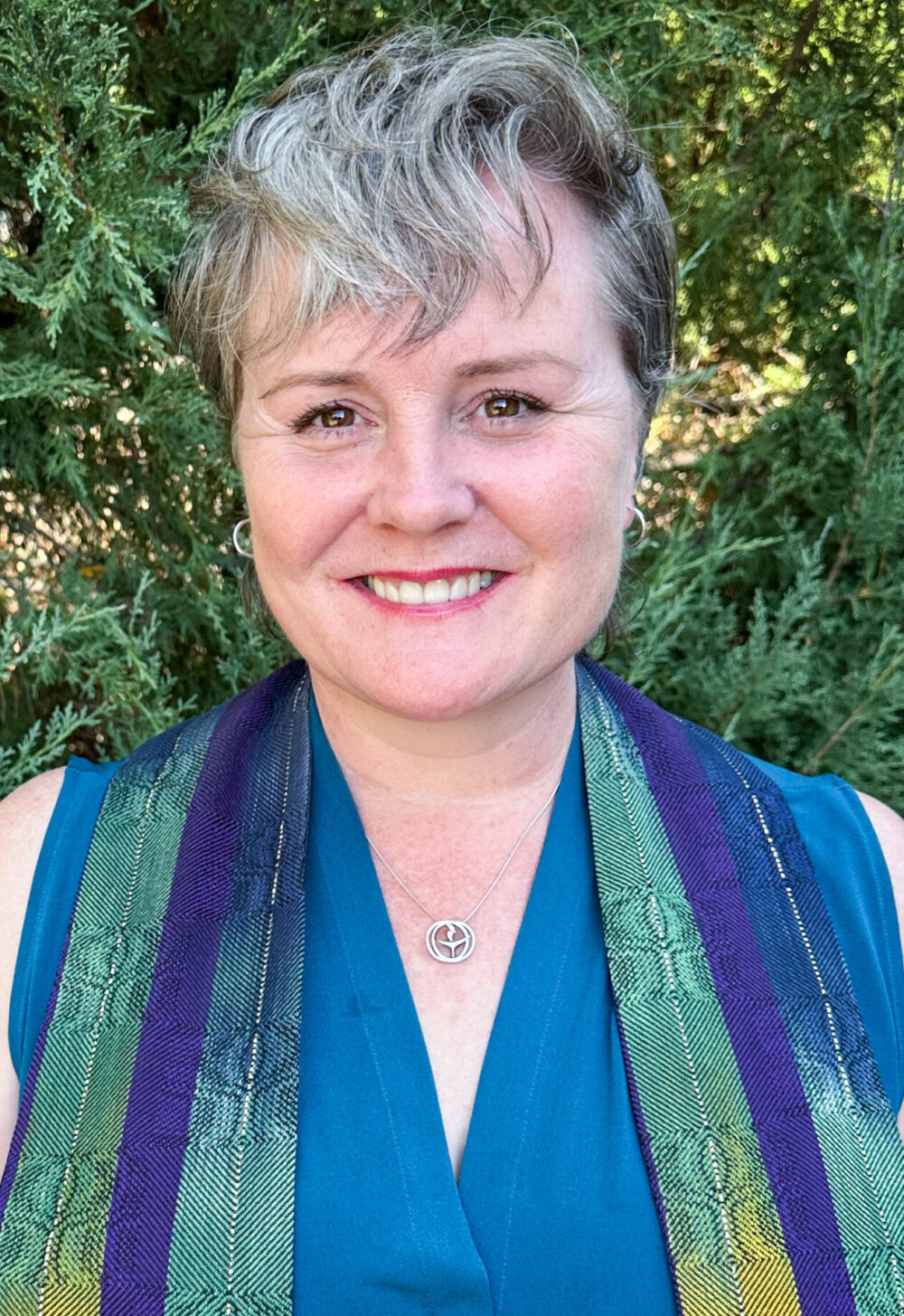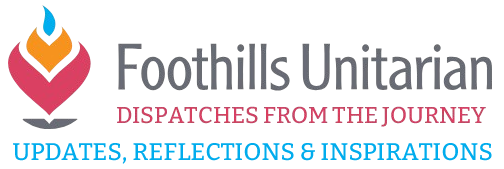There was a version of the sermon on Sunday that included a full exegesis of James Luther Adams’ reading…but as you heard – or
you’ll hear in the podcast – that version wasn’t the version that made it to the service. Too much else I wanted to say….
But, I know JLA is dense, and especially since the reading comes at the end of a long essay filled with all sorts of other ideas that culminate in this section….some might find it helpful to have a little more commentary….So, for those of you who fall into that category…my JLA exegesis on this reading on conversion.
First, the context for this reading – it is an essay he calls, the “Root Ideas of Human Freedom: The Changing Reputation of Human Nature.” In it he is exploring the relationship between rationality/rational order, human freedom, choice and the nature of the human being, in a theological sense. It was first presented at a meeting of the American Unitarian Association in May 1941. You can find the essay in the collection of his essays entitled
On Being Human Religiously (check out esp pg 40 – 54; this quote is from pages 53-54).
Throughout this essay, his motivating question – as I talked about on Sunday – is: what would create a liberal religion that would be able to effectively resist Fascism if it came to the United States? That is, a religion that would motivate and organize people for real impact in history.
He diagnoses the problem as being liberal religion’s optimistic orientation towards human nature, as well as its over-emphasis on the individual, rather than the corrective of the “association,” which is his term for the group you associate with.
Right before the section of our reading, he’s talking about our struggle to engage with the destructive portions of life and human nature, and instead an over-reliance on restraint, and reason, as if those could save us all. Here he starts to build towards one of the main points – reason alone can’t save us. Lots of people know how to reason – but that doesn’t mean they actually have the motivation, or the orientation, to direct their energy towards collective liberation and healing. For this, it requires the “affections” of the heart.
As the reading says, “It is not reason alone, but reason inspired by ‘raised affections’
that is necessary for salvation. We become what we love.”
It is hilarious to me that he’s describing how we need to better engage the heart, and he does so with such a restrained term as “raised affections,” but I also find it endearing. He swims in this water too.
Also, before the reading, he describes how we need to reckon with the enormity of the evil that exists in the world – we need to get in touch with it – so that we can motivate the necessary will to actually address it. At the same time, we need to reckon with the capacity for evil that exists within us – and the ways that our choices enable the evil in the world. He encourages a kind of individual repentance – a seeing-clearly that connects with a desire for change – that can foster world repentance – what he ultimately calls individual conversion (change) that leads to societal conversion.
Back to the reading – he wants to be clear that it isn’t that he thinks there is no place for the rational, or the intellectual approach in manifesting change, “Not that information and technique are dispensable. Even a St. Francis with commitment to the highest would be impotent when confronted with a case of appendicitis if he did not recognize the malady and did not know what to do.”
St. Francis – huge heart, right? Can’t solve all problems just with that heart. He needs information, education.
And so, JLA acknowledges: “One sector of the problems of society is its intellectual problems. Here no amount of goodwill alone can suffice. But something of the spirit of St. Francis is indispensable if the benefits of science and of society are to be in the widest commonalty spread, and for that matter, if even the intellectual problems are to be dealt with adequately.”
I really think that climate change is the best example right now of this insight – we need the science, we need the scientific options for where to go next – but we cannot solve climate change – we won’t have the will, and we won’t actually find the right solutions if we don’t also engage the heart, what he’s calling, “the spirit of St. Francis.”
He goes on, “The desire to diagnose injustice as an intellectual problem as well as the power of action to achieve a new form of justice requires ‘raised affections,’ a vitality that can break through old forms of behavior and create new patterns of community.”
This is a really complicated sentence – I take from it his sense that you can’t get people to even hear the “intellect,” (the climate science), let alone take the action required to fix an issue, without first touching their hearts. Because you have to change people’s behavior, and create new relationships, and new commitments. It’s really hard. Information alone, analysis alone, rationalism alone – cannot do it.
I left out a sentence in the reading, but in the text, he also adds this line at this point: “But the raising of the affections is a much harder thing to accomplish than even the education of the mind; it is especially difficult among those who think they have found security.”
This is the challenge of getting privileged people to care about the suffering of those who do not share their privilege. It requires what Bryan Stevenson calls “getting proximate.”
He goes on to describe how religious liberals have often failed to stimulate this heart-opening experience, as he says, “This element of commitment, of change of heart, of decision, has been neglected by religious liberalism, and that is the prime source of its enfeeblement. We liberals are largely an uncommitted and therefore a self-frustrating people.“
We focus on changing people’s minds – but we fail to engage the heart, to meet ourselves and the world in our real brokenness.
As he says, “Our first task then, is to restore to liberalism its own dynamic and its own prophetic genius.”
One of his main projects is to help liberalism claim its power. As one of his other essays says, “liberalism is dead. long live liberalism.”
And here he turns to conversion: “We need conversion within ourselves.”
By this he means – change, starting with repentance – a clear-eyed look at our own brokenness, and the world’s. Our own capacity for destruction, and society’s. To see and more importantly, to feel the human capacity for destruction, and how, either directly or indirectly, we are all a part of this suffering. (Remember, he wrote this in the context of Nazi Germany where he had been working along side the Confessing Church movement, attempting to overthrow the Nazis. There was a time where I wondered if or how his urgency translates to our world today. I don’t wonder this anymore.)
He does not mean to instill guilt, or shame, but only a sense of our responsibility, motivated by love. Love for others, love for the world, love for life itself.
As he concludes: “Only by some such revolution can we be seized by a prophetic power that will enable us to proclaim both the judgment and the love of God. Only by some such conversion can we be possessed by a love that will not let us go.”
It is the change of heart that fosters the necessary commitment to stand alone in transforming the status quo – the status quo of our individual lives, or of society. Conversion is a transformation of heart – a revolution of the heart – that comes when we feel this deep connection with our fellow humans, and take a personal sense of responsibility, because we are bound up together in this transcendent, ultimate, and universal love.
I hope that this helps a little in making sense of the JLA – and helps us keep the conversation going about this idea of conversion! It’s one of my favorite topics, so please feel free to comment with your questions or further thoughts.

Rev. Gretchen Haley has an audacious ambition for the liberal church, believing in its capacity to transform lives and our world by way of hyper-local relationships and partnerships that inspire the unleashing of courageous love. She oversees worship, community resourcing and outreach, and the intersectional work of our justice teams. She also serves as chief of staff, and ministry lead to the Board. In all of these, she is inspired by the commitment of the countless people who show up to do the sometimes-messy work of the church, and who are leading us to live into our mission for Northern Colorado as it is growing and changing. Her ministry is infused with her relentless curiosity about most things, especially the big stuff of theology, the beauty of creation, the magic of collaboration, and the joy of pop culture. She’s all in on adrienne maree brown’s emergent strategy, and finds solace in the trails in and around Fort Collins. She moved to Colorado from Washington state over 20 years ago for grad school in theatre, and knew immediately that she would never leave. She and her amazing partner, Carri, have 2 teenagers, Gracie and Josef, who both relish and resent being PKs, and who keep her grounded, frustrated, inspired, and humbled, everyday. She is basically obsessed with her two dogs, both large mutts, Charlie and Archer.
Responsible for: Worship, Community Resourcing and Outreach, Justice Ministries, and Congregational Leadership


 Over the last year, we have been inspired and strengthened by the the rising #MeToo movement, which seeks to end the silence around sexual assault, harassment, and misconduct that people of all genders, and especially women, have experienced, and to draw attention to the magnitude of the problem.
Over the last year, we have been inspired and strengthened by the the rising #MeToo movement, which seeks to end the silence around sexual assault, harassment, and misconduct that people of all genders, and especially women, have experienced, and to draw attention to the magnitude of the problem.